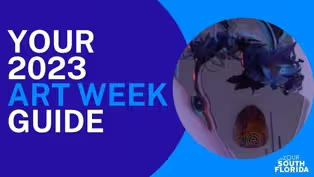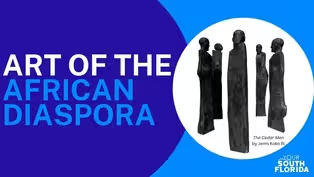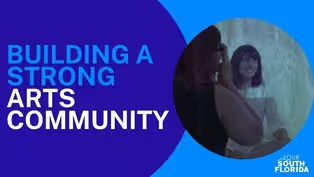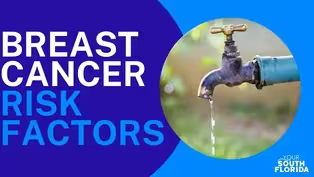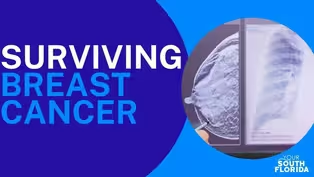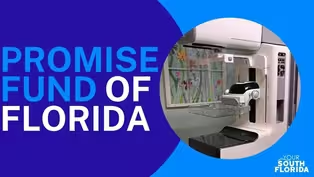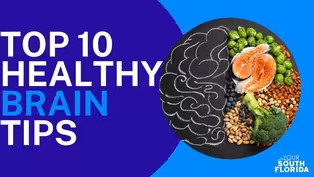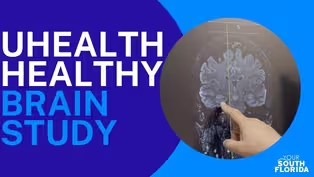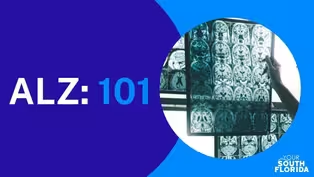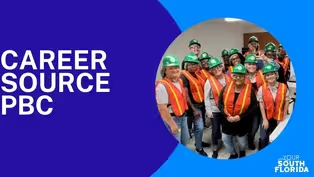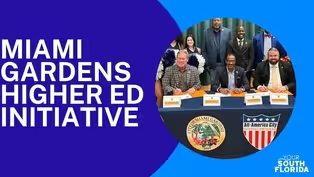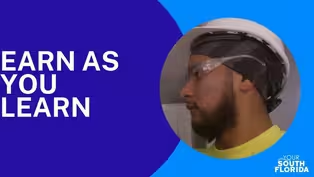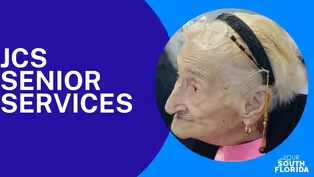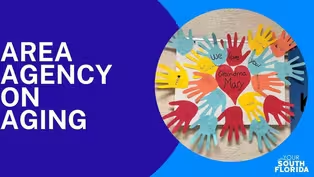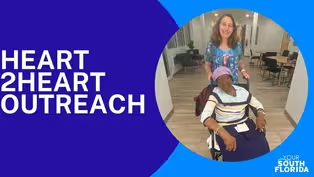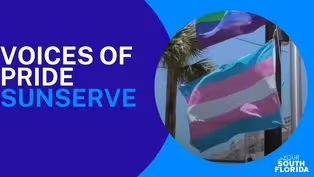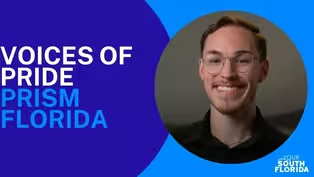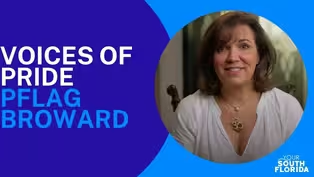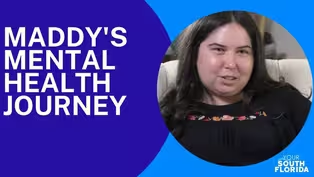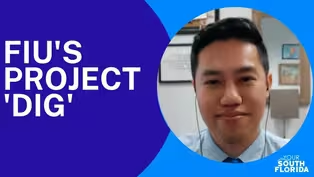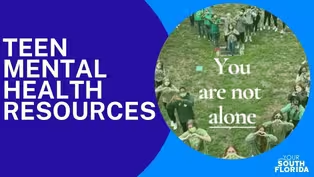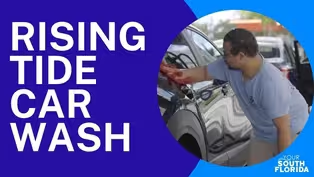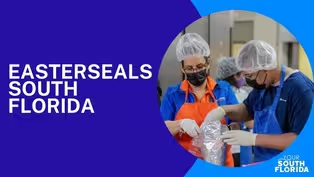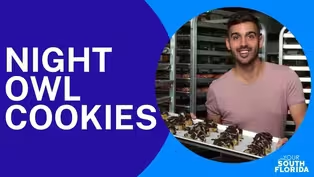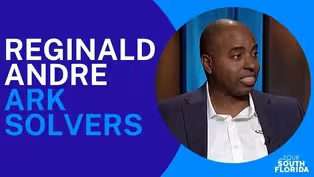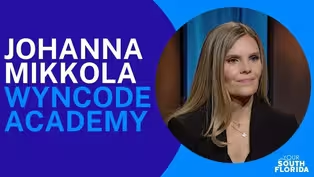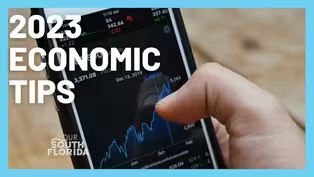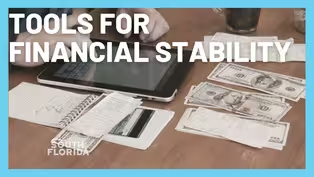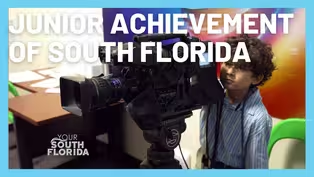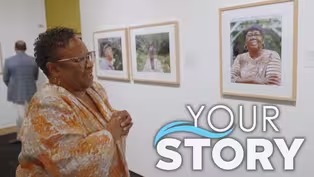Your South Florida
Mental Health Resources for Teens & Families
Clip: Season 7 | 12m 41sVideo has Closed Captions
Host Arlene Borenstein looks into local resources for at-risk teens and their families.
The latest data from the CDC shows U.S. teens are in the midst of a nationwide mental health crisis, and the issue is significantly worse for girls and LGBTQ+ teens. NAMI PBC CEO Katherine Murphy & Social Worker Amanda Kopacz joins guest host Arlene Borenstein to discuss what’s behind this alarming trend, and local resources for at-risk teens and their families.
Problems playing video? | Closed Captioning Feedback
Problems playing video? | Closed Captioning Feedback
Your South Florida is a local public television program presented by WPBT
Your South Florida
Mental Health Resources for Teens & Families
Clip: Season 7 | 12m 41sVideo has Closed Captions
The latest data from the CDC shows U.S. teens are in the midst of a nationwide mental health crisis, and the issue is significantly worse for girls and LGBTQ+ teens. NAMI PBC CEO Katherine Murphy & Social Worker Amanda Kopacz joins guest host Arlene Borenstein to discuss what’s behind this alarming trend, and local resources for at-risk teens and their families.
Problems playing video? | Closed Captioning Feedback
How to Watch Your South Florida
Your South Florida is available to stream on pbs.org and the free PBS App, available on iPhone, Apple TV, Android TV, Android smartphones, Amazon Fire TV, Amazon Fire Tablet, Roku, Samsung Smart TV, and Vizio.
Providing Support for PBS.org
Learn Moreabout PBS online sponsorshipMay is Mental Health Awareness Month and while all people, no matter their age, race or background can struggle with their mental wellbeing, the latest data from the CDC shows U.S. teens are in the mist of a nationwide mental health crisis.
And the issue is significantly worse for girls and LGBTQ+ teens.
In 2021, almost 60% of female high school students reported experiencing persistent feelings of sadness or hopelessness in the past year.
And 30% of teen girls seriously contemplated suicide.
The numbers are even more stark for LGBTQ+ teens, nearly 70% experienced feelings of sadness or hopelessness and 45% seriously considered suicide in the past year.
So what are the factors behind these alarming trends?
Joining me now to discuss this and much more is Katherine Murphy, CEO of the Palm Beach County chapter of the National Alliance on Mental Illness or NAMI.
You also have someone else virtually, Amanda Kopacz who you work with, peer specialist for NAMI of Palm Beach County.
Amanda is also a trauma informed yoga and mindfulness teacher and social work intern with Broward County Public Schools.
Thanks for joining us both here today.
Thank you.
Katherine, NAMI PBC has noticed these trends, people reaching out for help teens especially.
Can you tell us more about that and what you've been noticing?
Certainly.
So prior to the pandemic, a lot of the calls that we received were from caregivers or family members who are worried about somebody else.
Since the pandemic, we've had a huge increase in calls of people who are calling for themselves, who were feeling lonely, isolated, feeling anxious, depressed for the first time and so we definitely saw a huge rise in that.
Wow.
It is alarming and Amanda, through your roles with NAMI, you've also seen the same, correct?
Yeah, absolutely, with NAMI and with the Broward School District, being within the environment is a little different.
And you communicate with the community on a daily basis.
What are some of the big stressors going on affecting teen mental health that you see each day?
Whew, absolutely.
I would say they're overall just, they're very dysregulated.
So everything that we sort of knew as normal got flipped upside down and I don't think there's really been an opportunity to get back to any sense of real normal.
So that's a lot of it.
I would say that they're struggling with things that we've all heard about, things like social media, a lack of sleep, and part of that does have to do with social media and having to get up at 4:30 or 5:00 in the morning to catch the bus to school.
I think that's a big factor.
There's a lot of instability in the school system.
We have a lot of teachers that have left the profession so a lot of the students have sort of permanent substitutes and kind of don't know who they're gonna have from one day to the next.
So there's just so many challenges.
I think the kids are res responding very naturally to very unnatural circumstances.
To your point, there is a critical shortage of mental health professionals and social workers in public schools, which is only making things worse throughout this mental health crisis.
Tell us, Amanda, more about the work you do specifically for Broward students and the need for mental health professionals and social workers throughout the district.
Absolutely.
So the work I do it varies from one day to the next.
Overall I offer support and that support can be emotional support in developing coping skills, it can be supporting the HEART program which is our students that are either homeless or in some sort of housing transition or instability.
Making sure that they're able to physically get to school, that they have school supplies, they have shoes, and other essentials.
I support kids basically, I tell them in any aspect of their life that's not academic but is all affecting their academics and affecting their success.
Another thing I do is trauma informed yoga and mindfulness classes during their lunchtime.
They can come voluntarily.
I always have a big group of students even though they self-select to be there and they find it really helpful just to have an opportunity to feel safe, to feel calm, to learn how to regulate their nervous systems.
So that's been something that's really helpful as well.
And you know, Katherine, as you're hearing Amanda talk about these issues and the shortages, how do you fill the gap at NAMI?
Maybe not you specifically, but your team of people there.
How do you address these issues for our community?
So we support students in two ways.
One is we have a presentation called NAMI ending the Silence and we go into middle schools and high schools and talk to students about early warning signs and mental health conditions, what to look out for, how to start conversations with their friends, with their school staff, with their families.
And we also introduce them to the mental health professionals at the school.
In addition, we work with their families.
We have support groups, classes, we can answer the phone and talk to family members and help them to navigate the mental health system.
We have a crisis guide, which can help the parents to understand what to do in case of a crisis and we have just a ton of resources to help to educate them so that they can best support their child.
Yes, that sounds wonderful and something that these children really need at this very difficult time.
You know, you think you're out of covid and that isolation but the lingering effects of that is really what seems like we're talking about here among so many other things that affect mental health.
Amanda, you've long been an advocate for mental health.
You just received your master's in social work.
Congratulations to you, such great work.
What was the turning point that led you to go kind of all in to help the community?
I would say that there are layers to my journey.
You know, I came into mental health as an advocate based on lived experience.
I come from two things.
I come from a long line of helping professionals, a lot of nurses and teachers.
I am not the first social worker in my family and also a long line of mental health challenges and conditions.
So a lot of major depression and bipolar in my family and including a child.
So I've survived multiple suicide losses amongst my loved ones and I have a daughter that survived a major suicide attempt about seven years ago and that's what kind of lit a fire for me to be more vocal.
I was kind of a quiet advocate and became a very loud advocate.
Wow.
So that led me to my volunteer work with NAMI and then eventually working with NAMI and doing a lot of education and outreach and support.
And I found when I was trying to refer individuals and families for specifically things like trauma therapy or therapy for individuals with persistent mental illness, that we just didn't have enough local providers.
So I decided eventually I could be one.
And I went back to school.
I went back for graduate work for my master's in social work and that's my long-term goal is to be a trauma therapist, especially.
What's, yeah, what work could be a bigger inspiration than you know, our children and people who are so close to us, our loved ones.
So thank you for your bravery and seeing what's going on with your own loved ones and moving that forward.
I think a lot of families watching right now can connect with that and you know, Katherine that type of support that families need, for example, I may come in and ask you about a personal situation that we're going through.
What should families expect when they walk in?
What type of programs or initiatives may they be met with like right off the bat?
Sure.
So they can start with a phone call to our office and find out what it is that we offer and maybe we offer them the resource that they need and if not, we can also help them to navigate the mental health system within the county.
And if we don't offer something in Palm Beach County or if they need help outside, there are 24 NAMI's in Florida over 600 throughout the country, we might be able to help connect them to a resource where they do live.
Specifically for parents, a teen daughter having trouble, what may they be able to do?
So we have a support group.
It's on Zoom every Wednesday night and all of our groups are led by and for people with that particular type of lived experience.
So we have family groups which are led by family caregivers for other family caregivers or we have support groups by and for people who are living with or experiencing mental health conditions.
And so a family who came to us, they might start with our family support group and they, like I said they can attend on Zoom from wherever they are, the comfort of their own home.
We also have classes that help to train them educate them on the ins and outs of this journey of supporting somebody with a condition.
What's the community telling you?
What's been the feedback as of late?
You hear these startling numbers.
What's been your experience with NAMI PBC in our own community?
So what I hear, we just did a big survey on our support groups and the biggest comment was that we helped to give people hope and that we helped them to feel less alone.
And that there are other people who understand what they're going through.
A lot of times mental health conditions are very private conditions people go through.
We say that they're not a casserole illness.
People don't bring you a casserole if your child is in the mental health hospital or if you go through a crisis or have a relapse.
And so at NAMI we understand what that is like to go through these tough situations and to try to reduce the stigma and help people feel like they have a place to go, to a place where they can talk about these things.
So Amanda, you're the boots on the ground, you help people different levels within the Broward County public school system, also through NAMI.
You've been dealing with this with your own family.
So what advice, valuable advice, would you give to parents and caregivers for children who are going through these mental health struggles?
For one thing, if I reflect on what advice I needed as a parent, it was to really pay attention.
I think for a little while I maybe overlooked what were symptoms and kind of delayed getting help because I just thought it was normal teenage stuff.
So I think that's one of the amazing things NAMI does is the education around what is a mental health symptom and what is kind of typical adolescent behavior.
So I think that that is part of it, having the conversation having very open conversations and I know sometimes that is tricky when we're talking about teens, but really leaning into affirming their experience, what they've been through over the last few years none of us experienced in our youth.
So I think it goes a long way to to validate that they're struggling.
So I think that that opens up conversations.
I would say don't be afraid to have the hard conversations.
If a teen is asking for help and support, I wouldn't delay.
I would start looking for that support.
A very common experience I have with the students is they have families that don't want therapy that don't believe necessarily in mental health conditions and that makes it really challenging for the kids that do want support.
So, you know, just being openminded.
It's like any other health condition.
We have a lot of components to our wellness and just like we wouldn't delay if we had a cavity growing, we would go see a dentist, same thing.
If there's something developing in the realm of mental health there's no shame.
There shouldn't be any stigma in seeking support for that.
Absolutely.
And Katherine how can the community support NAMI's mission and all the wonderful things you do?
To build off of what Amanda just said to start by being stigma free.
So to recognize at home, in the workplace, at the office that people experience mental health and behavioral health challenges and to be there and be supportive of them.
One way that we're doing that is in May we have the Get your Green on campaign.
We encourage everyone to wear green, which is the color for mental health awareness.
[Arlene] You're wearing it today.
[Amanda] May 18th to show their support.
[Arlene] Wonderful.
[Amanda] And to just start those conversations and people can always reach out to us if they need support.
And we're gonna have a huge community event on November 4th at John Prince Park in Lake Worth, NAMI Walks, it's a great opportunity for people to come out and meet us, talk to other people who are involved in this movement and to find out where to get resources and help.
I've heard of NAMI Walks, excellent event, raises good money for a great cause.
And I just wanna say thank you to both of you for shining your bright light for so many people who may not have it right now.
So again, thank you for joining us today.
Thank you.
Your Expert Guide to Miami Art Week 2023
Video has Closed Captions
Clip: S7 | 28m 44s | We share tips for your best Miami Art Week 2023 experience. (28m 44s)
Discover The Art Transforming Opa-locka
Video has Closed Captions
Clip: S7 | 10m 27s | Discover The Art Transforming Opa-locka. (10m 27s)
Dennis Scholl on Housing Help for Artists
Video has Closed Captions
Clip: S7 | 8m 51s | Dennis Scholl discusses South Florida's burgeoning art scene & its impact on the economy. (8m 51s)
Video has Closed Captions
Clip: S7 | 9m 38s | Breast cancer researchers are studying an alarming trend in South Florida. (9m 38s)
Latest TIPS for Breast Cancer Prevention and Treatment.
Video has Closed Captions
Clip: S7 | 11m 31s | Join us in this important conversation about breast cancer prevention and treatment. (11m 31s)
Connecting Women to FREE Mammograms
Video has Closed Captions
Clip: S7 | 6m 14s | Early detection is vital to breast cancer survival. (6m 14s)
TOP 10 Tips to Help You LOVE Your Brain
Video has Closed Captions
Clip: S7 | 6m 53s | Learn about early detection and lifestyle changes for maintaining brain health. (6m 53s)
Healthy Brains Helping Researchers Fight Alzheimer's
Video has Closed Captions
Clip: S7 | 7m 9s | We look at how to better treat and prevent Alzheimer’s and related dementias. (7m 9s)
All You Need to Know About Alzheimer's
Video has Closed Captions
Clip: S7 | 12m 58s | We shed light on the latest developments in Alzheimer's care and support. (12m 58s)
Vocational & Workforce Resources
Video has Closed Captions
Clip: S7 | 10m 55s | CareerSource PBC is helping job seekers learn the skills they need. (10m 55s)
Video has Closed Captions
Clip: S7 | 10m 44s | Get the details on a new program making higher education more accessible. (10m 44s)
Video has Closed Captions
Clip: S7 | 5m 7s | We get an inside look at how apprenticeships can be a win-win for students and businesses. (5m 7s)
JCS Providing Meals & Community
Video has Closed Captions
Clip: S7 | 6m 2s | Jewish Community Services of South Florida works to maintain the health of seniors. (6m 2s)
Helpline for Older Adults & Caregivers
Video has Closed Captions
Clip: S7 | 9m 35s | Learn how the Area Agency on Aging of Palm Beach/Treasure Coast is helping older adults. (9m 35s)
Video has Closed Captions
Clip: S7 | 8m 55s | Heart2Heart Outreach of South Florida provides care for lonely seniors. (8m 55s)
Voices of PRIDE: Transgender Community
Video has Closed Captions
Clip: S7 | 5m 59s | We visit SunServe in Wilton Manors to hear from members of the Transgender community. (5m 59s)
Voices of PRIDE: Gen Z & LGBTQ+
Video has Closed Captions
Clip: S7 | 3m 27s | PRISM is a non-profit providing resources to South Florida' LGBTQ+ Gen Z community. (3m 27s)
Voices of PRIDE: A Parent's Perspective
Video has Closed Captions
Clip: S7 | 3m 17s | Lisa McCourt shares her perspective as the mother of a Transgender daughter. (3m 17s)
Video has Closed Captions
Clip: S7 | 4m 12s | We profile Maddy Tasini and her mental health journey. (4m 12s)
FIU Addresses Shortage of School Mental Health Professionals
Video has Closed Captions
Clip: S7 | 6m 34s | FIU has a new program that helps students with mental health issues. (6m 34s)
Mental Health Resources for Teens & Families
Video has Closed Captions
Clip: S7 | 12m 41s | Host Arlene Borenstein looks into local resources for at-risk teens and their families. (12m 41s)
Rising Tide Car Wash's Neurodivergent Workforce
Video has Closed Captions
Clip: S7 | 7m 3s | Rising Tide Car Wash is a successful business thanks to it's non-traditional workforce. (7m 3s)
Culinary Arts Program for Neurodivergent Students
Video has Closed Captions
Clip: S7 | 6m 1s | For decades, Easterseals South Florida has been helping neurodivergent students. (6m 1s)
Andrew Gonzalez l Road to Entrepreneurship
Video has Closed Captions
Clip: S7 | 7m 30s | Miami native Andrew Gonzalez followed his dream of making and selling late-night cookies. (7m 30s)
Reginald Andre l Road to Entrepreneurship
Video has Closed Captions
Clip: S7 | 7m 55s | Hear Reginald Andre talk about his inspirational entrepreneurial journey. (7m 55s)
Johanna Mikkola l Road to Entrepreneurship
Video has Closed Captions
Clip: S7 | 11m 6s | Johanna Mikkola saw the value in bringing a unique brand of coding bootcamps to S. Florida (11m 6s)
Your 2023 Economic Tips l Your South Florida
Video has Closed Captions
Clip: S7 | 9m 42s | Dr. Albert Williams shares his tips for financial health. (9m 42s)
Tools for Financial Stability with United Way Miami
Video has Closed Captions
Clip: S7 | 6m 27s | Nearly 6 out of 10 Miami households are living in or are on the verge of poverty. (6m 27s)
Junior Achievement of South Florida l Your South Florida
Video has Closed Captions
Clip: S7 | 6m 20s | Junior Achievement of South Florida teaches students about finances and building a career. (6m 20s)
Photographing Boca Raton’s Oldest Neighborhood | Your Story
Video has Closed Captions
Clip: S7 | 7m 22s | Founded in 1915, Pearl City is the oldest neighborhood in Boca Raton. (7m 22s)
Providing Support for PBS.org
Learn Moreabout PBS online sponsorshipSupport for PBS provided by:
Your South Florida is a local public television program presented by WPBT
